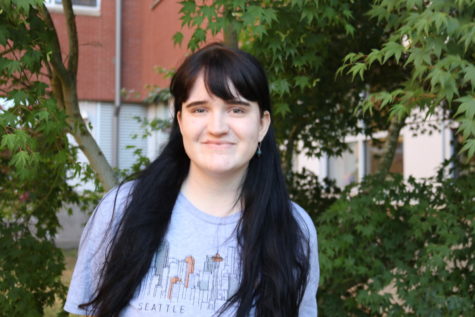Preferred pronouns deterred?
April 16, 2023
A distorted perception of one’s sense of self. Subtle disrespect and disregard, packaged in everyday language. Words have power, and a lot of it–they have the ability to help or seriously harm others. The ways in which we treat others with words does a lot to create an image of who they are in both their perception and our own. And careless language can be a serious source of distress for many people, including a very sizable portion of Shorewood’s student body. Some feel that both teachers and students struggle with gendering students correctly, and this makes many students feel uncomfortable and unsafe at school.
Cilas Moyers is a junior with a history of getting misgendered throughout his high school experience. “It doesn’t matter what teacher it is, or how long they have known me,” he says. “I have been misgendered at least once by all but one of my teachers.” Despite a recent rise in awareness among teachers towards the issue of accidentally misgendering their students, Moyers maintains that he has not seen significant progress, and it’s still intensely difficult to make himself known. “I’m trying to stand up for myself more, and correct others on my pronouns,” he says. “[But] this is my teacher, and they will see me most every day. If I misjudge how they’ll react [to be being corrected], it could cause that class to be the one I want to skip for the rest of the year.”
Sophomore Sylvan Thompson can attest to the frustration of having his identity overlooked. “Many people I have interacted with put little to no effort [into using peoples’ preferred pronouns,]” he says. “After a while you get tired of correcting people because it feels hopeless.” The student body also has a long way to go towards making people feel safer and more comfortable, some say. “Overall, students are better at using the correct pronouns, but I still get misgendered on a daily basis,” Thompson says. He chalks this up to a generational gap between students and teachers. In the past, it was even more difficult than it is now for trans and non-binary students to be open about who they are, and many never came out to their peers. In a lot of ways, life is a lot better now for students who decide to come out.
“There are some students who I genuinely believe see me the same way I see myself. Even excluding my closest friends, there are students who defend me and who will stick up for me when my identity is attacked or questioned,” Moyers confirms. But in a lot of ways, life is painfully difficult. “There are also students who I feel I can’t tell about my identity,” Moyers says. “When I pass them in the halls, I hide the trans pride items that I usually so proudly wear.”
This is a near-universal experience for trans and non-binary teens. “I wish people could be a little bit more understanding,” Thompson says. “It takes a lot of effort to figure out your pronouns, and then to come out and tell people, and then [to deal with] constantly correcting people.” This can be even harder in the middle of a school year. “Changing your pronouns is hard enough, [but] having to decide whether you want to share the information with your teachers, fearing whether they would be accepting [of you], [is even harder],” Moyers adds.
So what is there to be done about this issue? Actually, quite a lot.
In a place like school, respect starts with those in positions of authority. When it comes to measures to learn students’ preferred pronouns, Moyers has seen everything under the sun, but he thinks that beginning-of-the-year surveys are most successful for teachers and least stressful for students.
“Some students don’t have an accepting family life, or an accepting support group within the school,” he says.
“Letting them address the issue of their identity, without potentially outing them to other students, is such a great resource and connection to make.”
He also emphasizes the importance of being understanding in more ways than just remembering preferred pronouns: teachers should make an effort to truly get to know their students.
Says Moyers: “I have no negative feelings towards any of my teachers, I just have to wonder whether my existence in their lives is less a teen boy, and more just a face and a memorized set of pronouns.”



